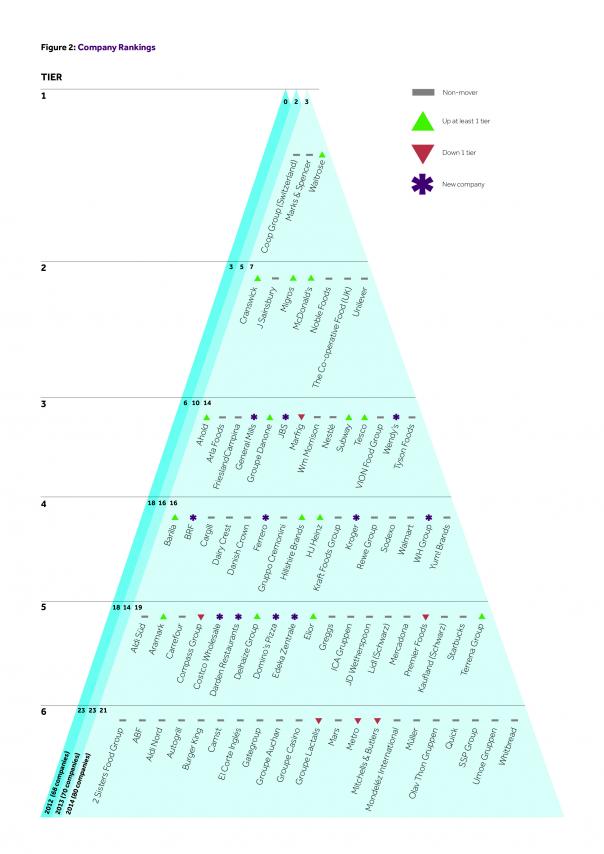
The Business Benchmark on Farm Animal Welfare (BBFAW), now in its third year, provides an annual review of how leading food companies manage farm animal welfare practices.
The report is compiled in collaboration with farm animal welfare organisations, Compassion World Farming and World Animal Protection. It reveals that 45% of the 65 companies assessed since the first report in 2012, have moved up at least one tier.
Marks & Spencer and Coop Group (Switzerland) have retained their tier one position for the second year running and have been joined by Waitrose, which has climbed two tiers. The Co-operative Food (UK), J Sainsbury and Unilever have maintained their position in tier two for the second year running.
Despite these improvements, the report finds disappointing overall progress with half of the 80 companies assessed in 2014 appearing in the bottom two tiers, indicating that farm animal welfare is not receiving the same management attention as other corporate responsibility issues.
The report also finds that the restaurant and bar sector continues to lag behind food retailers and producers. Within the sector, there is a clear divergence between companies that are public facing and those that are business-to-business.
It notes sandwich store Subway appears in tier three while Gategroup Holding and SSP Group Limited, appear in tier six and Compass Group and Elior are in tier five.
Jeremy Coller, founder of one of the UK’s biggest private equity groups, explained the growing importance of this issue among major investors.
He said: “Farm animal investment risks and returns must be managed if we want healthy food on our plates and healthy returns from our portfolios – as recent food scares, scandals and tightening EU regulation have all underlined.
“This report will help investors understand which food companies are taking farm animal welfare seriously. It must surely be a concern that over half of companies currently languish in the bottom two tiers of the Benchmark.”
Programme director, Nicky Amos, said: “It’s encouraging that 84% of companies covered by our assessment acknowledge farm animal welfare as a business issue, and that 64% of companies have published farm animal welfare policies.
“This suggests that companies are starting to respond to the growing interest being paid to the food industry on this issue.
“However, with an average overall score of 30%, and 40 of the 80 companies appearing in the lowest two tiers of the Benchmark, it is evident that farm animal welfare remains an immature business issue.”
Of the 18 UK companies assessed, nine are amongst the 24 companies in the top three tiers, highlighting the country’s commitment to farm animal welfare and the management system.
Malcolm Copland, commercial director, Greggs, said: “Greggs works hard to retain its status as a much loved and trusted brand by demonstrating that it is a responsible company.
“Avoiding the exploitation of animals is consistent with not only our company values but our desire to meet consumers' rising expectations in terms of farm animal welfare - the Business Benchmark provides us with a practical and respected framework, against which we can assess the progress that we have made and identify areas for improvement, ultimately driving positive change within the business.”
The Benchmark is designed for use by investors, companies, NGOs and other stakeholders interested in understanding the relative performance of food companies in the animal welfare area.